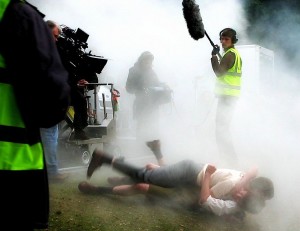Kip Jones’ draft Chapter for The Routledge International Handbook on Narrative and Life History was deposited today on BRIAN and Academia.edu. The book’s section on Ethics is edited by Ivor Goodson, with assistance from Ari Antikainen, Molly Andrews and Pat Sikes. Jones’ Chapter entitled, “Styles of Good Sense—Ethics, Filmmaking and Scholarship” is based upon his experience as researcher, author and producer of the award winning short film, RUFUS STONE.
Jones proposes that aesthetics and ethics need to be considered in concert and that they are at the very heart of arts-based research. Ethics and Aesthetics become intertwined and support one another. Jones states:
‘Ethics, much like aesthetics, is often misunderstood as something effusive, illusive and somehow, decision-making by the few on a rarefied echelon, involving pronouncements of grand moral impact and/or sophisticated discrimination. For these kinds of reasons and to avoid potential headaches, it is often assumed that checklists and committees will be far better at making such decisions than mere individuals.’
Jones believes that ethics and aesthetics need to remain the prerogative of the researcher/filmmaker and her/his participants and audiences. By developing a trust in instinct and intuition and the naturally expressive and moral potential of our personal resources, research involving people’s stories can become richer and more human, if we only are willing to jettison some of the baggage of the old academic rigor and dry procedural ethics.
Jones’ involvement in the section of the book on Ethics will include co-contributors Arthur Frank, Norm Denzin, Laurel Richardson and Carolyn Ellis, and will be published in the New Year.

 New Chapter on “Film as Research/ Research as Film” from Hearing and Jones
New Chapter on “Film as Research/ Research as Film” from Hearing and Jones










 Second NIHR MIHERC meeting in Bournemouth this week
Second NIHR MIHERC meeting in Bournemouth this week Dr. Ashraf cited on ‘Modest Fashion’ in The Guardian
Dr. Ashraf cited on ‘Modest Fashion’ in The Guardian NIHR-funded research launches website
NIHR-funded research launches website MSCA Postdoctoral Fellowships 2025 Call
MSCA Postdoctoral Fellowships 2025 Call ERC Advanced Grant 2025 Webinar
ERC Advanced Grant 2025 Webinar Horizon Europe Work Programme 2025 Published
Horizon Europe Work Programme 2025 Published Horizon Europe 2025 Work Programme pre-Published
Horizon Europe 2025 Work Programme pre-Published Update on UKRO services
Update on UKRO services European research project exploring use of ‘virtual twins’ to better manage metabolic associated fatty liver disease
European research project exploring use of ‘virtual twins’ to better manage metabolic associated fatty liver disease